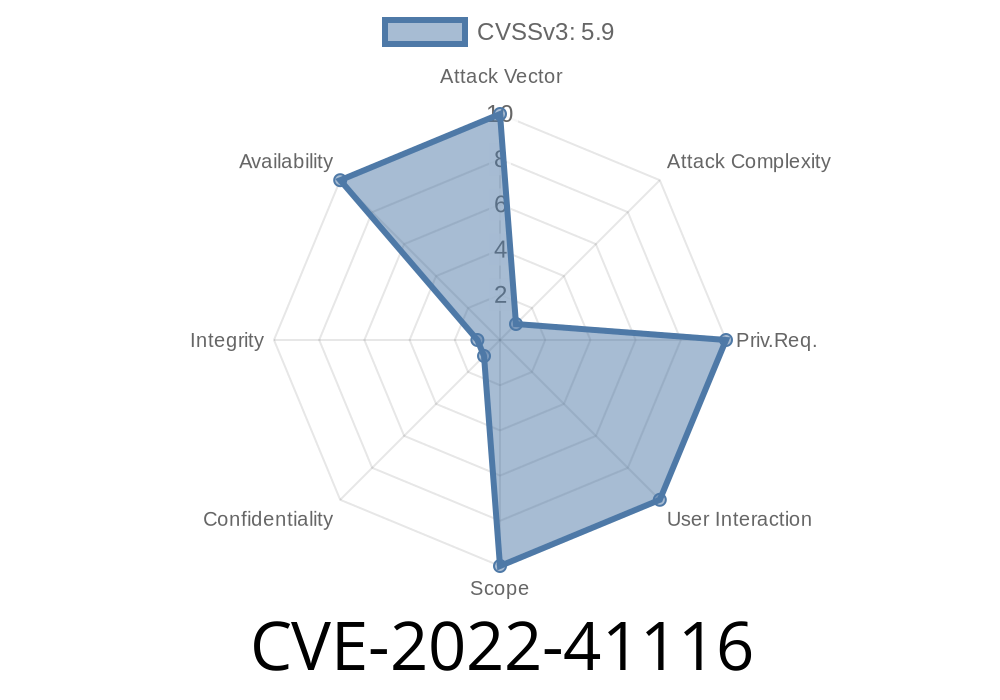In late 2022, Microsoft disclosed CVE-2022-41116, a Denial of Service (DoS) vulnerability in the Windows implementation of the Point-to-Point Tunneling Protocol (PPTP). If you run VPN services or RAS servers on Windows, this risk demands your attention! This article breaks things down in simple language, providing unique insight, code snippets, exploit details, and helpful resources.
---
What is CVE-2022-41116?
CVE-2022-41116 is a Denial of Service flaw found in the Windows implementation of PPTP. *PPTP* is one of the oldest VPN protocols, and while largely replaced by newer, more secure methods, it’s still supported in Windows for backwards compatibility.
By sending specially crafted PPTP packets to a machine’s open VPN port, a remote attacker can cause the target machine to crash or become unresponsive. This can cause service outages, interruptions, and, in some cases, even a full system crash (BSOD).
Microsoft’s Official Reference
- Microsoft Security Update Guide – CVE-2022-41116
Distinction from Similar CVEs
It’s worth noting: CVE-2022-41116 is *different* from CVE-2022-41090, even though both relate to Windows networking protocols. Always ensure you’re referencing the correct CVE in your patch management and risk assessments.
How Does the Exploit Work?
To exploit this vulnerability, an attacker must successfully send specific, malformed PPTP packets to the PPTP server. If the target system processes these malicious packets, it can trigger a system exception—leading to resource exhaustion or even a crash.
A basic understanding of the PPTP protocol is helpful. It typically uses TCP port 1723 to initialize connections and then expects certain kinds of packet structures once connected.
Attack Flow Diagram
Attacker Target Windows System
| |
| ------ Malicious PPTP Packets ---->|
| |
| [PPTP Service Crashes or Freezes]
| |
Code Snippet: Simulating Malicious PPTP Traffic
While we *do not* condone unethical use, here is a *simplified* Python script just for educational purposes that demonstrates sending garbage data to the PPTP port. (This does NOT exploit the exact flaw, but illustrates the method):
import socket
target_ip = 'TARGET_WINDOWS_IP'
pptp_port = 1723
malformed_packet = b'\x00' * 512 # PPTP expects a specific format; this is just random data.
with socket.socket(socket.AF_INET, socket.SOCK_STREAM) as s:
s.connect((target_ip, pptp_port))
s.sendall(malformed_packet)
print('[*] Sent malformed PPTP packet')
*Note: Actual exploits might require deeper PPTP structure emulation. The above code is harmless unless targeting a system with the precise vulnerability.*
Proof-of-Concept & Exploit Discussion
Public proof-of-concept (PoC) code for this CVE is limited, but similar vulnerabilities have been publicly exploited in the past. Active exploitation can cause the target to:
Require manual reboot to restore services
Because PPTP is rarely encrypted or authenticated until later in the handshake, attackers do not need user credentials—only network access to port 1723.
How to Mitigate CVE-2022-41116
1. Patch Immediately: Microsoft released patches in the November 2022 update round. Always keep Windows Server and Windows client systems up to date.
- Microsoft Security Update Guide
2. Disable PPTP Where Possible: Prefer secure VPNs like L2TP/IPsec or OpenVPN. PPTP is outdated and not recommended for new deployments.
Relevant References & Further Reading
- Microsoft Official CVE-2022-41116 Entry
- Microsoft Advisory: November 2022 Security Updates
- Wikipedia: PPTP
- CVE Details for 2022-41116
Final Thoughts
CVE-2022-41116 is a strong reminder that even legacy protocols, if left enabled, can expose modern networks to denial of service attacks. If your Windows systems expose the PPTP VPN service, assess your exposure, patch without delay, and consider decommissioning PPTP in favor of more secure alternatives.
Timeline
Published on: 11/09/2022 22:15:00 UTC
Last modified on: 11/15/2022 16:04:00 UTC
